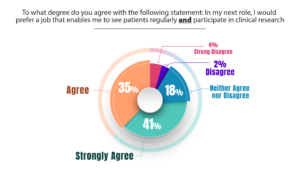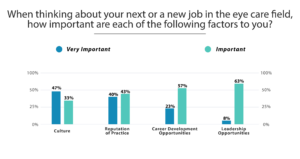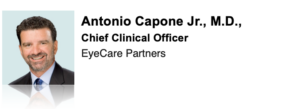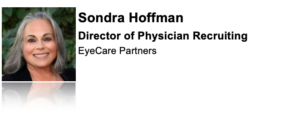Early-Career Eye Doctors Are Seeking Jobs with Flexibility and Positive Culture
With the eye care market continuously growing, it is becoming increasingly important to better understand what matters most to early-career ophthalmologists and optometrists in order to attract and retain top talent.
Ophthalmology 360 teamed up with EyeCare Partners (ECP), one of the leading employers of eye doctors nationwide, to survey more than 100 early-career ophthalmologists and optometrists from across the U.S. Together, they illuminated how the newest eye doctors in the industry are approaching their career and what they value and expect from their jobs.
Below are some of the key findings.
Early-career physicians value roles that enable them to see patients regularly and participate in clinical research

A decade ago, it was typical for ophthalmologists to make a choice after completing their residency: pursue a career in practice with a focus on patient care, or pursue a career in academia with a focus on research. Recently it has become more common for early-career physicians to seek positions that enable them to pursue both. In fact, 76% of respondents to the survey agreed or strongly agreed that they would prefer a job that allows them to “see patients regularly and participate in clinical research.”
“The ability to engage in clinical research is an important motivator for many physicians who are not only interested in directly supporting the patients they see in practice, but who also want to contribute to the advancement of the field of ophthalmology,” said Antonio Capone Jr., M.D., Chief Clinical Officer of ECP.
EyeCare Partners recognized this trend several years ago and began making organizational changes to enable physicians across the ECP network to engage in both patient care and clinical research. In 2022, the company introduced the EyeCare Partners Innovation Center, which brings together clinical data from more than 1,000 eye care providers into a central resource to improve patient outcomes, elevate patient care and drive sight-saving research advances. Physicians are able to initiate their own studies or contribute to research that is already underway. To date, ECP doctors have participated in more than 200 clinical studies.
Training shouldn’t end when residency ends
The fields of optometry and ophthalmology have grown increasingly complex as new therapies come to market and surgical techniques continue to evolve. The survey results show that early-career doctors are recognizing the need for continued training once they join the workforce: 69% say that mentoring and education opportunities are “important” or “very important” when seeking a new job and one in five (19%) respondents said the opportunity for training and development was the “most valuable” benefit when considering their next opportunity.
Sondra Hoffman, Director of Physician Recruiting at ECP, said that practices should plan a comprehensive approach to onboarding and training early-career physicians, and she emphasizes the importance of not only clinical training and mentorship, but also teaching the financial and operational aspects of the practice, such as billing and coding and staff relations.
She also says that practices looking to attract early-career physicians should consider developing a mentorship program that pairs new recruits with more senior physicians. If a practice includes multiple locations, there can be advantages to pairing mentees with mentors in other offices so they can benefit from a diverse mix of expertise, practice perspective and practice patterns.
EyeCare Partners created a career development committee within its Medical Education Board to ensure that training and development opportunities are available to doctors across its network. The company also recently launched the Advanced Comprehensive Ophthalmology Fellowship (ACOF) program at three of its practices starting in 2024, which enables graduates of residency programs to gain more extensive training in advanced diagnostic, therapeutic and surgical techniques.
Great organizational culture is among the most important factors for job seekers

When asked to rate the importance of different job factors, culture was cited as “very important” among 47% of respondents, with another 33% ranking it as “important.” Other highly ranked included:
- Reputation of practice (40% very important / 43% important)
- Career development opportunities (23% very important / 57% important)
- Leadership opportunities (8% very important / 63% important)
Culture is a factor not only in hiring great talent, but also in retention. According to Hoffman, when doctors say they want “great culture” they typically mean a place where patient needs are prioritized, where staff members feel included and are treated with respect and where the doctors have a seat at the table when it comes to decision making. This is supported by other studies showing that the vast majority of Gen Z workers say it is important for them to feel valued, included and empowered at work.
“Practice leadership is the basis of a positive culture – and it’s why having strong physician leaders is so important,” said Capone. “Physician leaders set the tone for practices. Particularly now, when practices are competing for new doctors, having strong leaders in place who can build an inclusive and empowering practice culture is critical.”
Flexibility is paramount when it comes to job benefits

When asked which added benefits they would consider most valuable when seeking a new job, “flexible hours” was the top response (35%), outranking leadership opportunities (30%) and opportunities for training and development (19%).
The result reflects a broader trend among younger workers to prioritize time and balance above more traditional motivators such as compensation.
“A large number of the doctors we interview have young children and they want time to spend with their family. They don’t want 60-hour work weeks,” Hoffman said.
In response, Hoffman says some practices in the ECP network are offering four-day work weeks. “In some cases, doctors are taking less money to spend more time at home with their families, it’s a balance,” she added.
Negotiating on-call time has also become more common. “It used to be traditional in most practices that the newer doctors would take more of the weekend and evening on-call duties and senior practitioners would take less,” said Hoffman. However, Hoffman says a growing number of early-career doctors are seeking practices that take a more equitable approach, sharing on-call hours equally among both junior and senior staff members.
Not all job opportunities are created equal

While 37% of early-career ophthalmologists and optometrists say they see the job market for eye care providers as strong, the majority (60%) characterize it as “mixed” with “limited opportunities that are highly attractive.” This response may indicate that, while jobs for eye doctors are plentiful, not all opportunities provide the mix of benefits that early-career doctors are seeking.
When asked where they see the greatest career opportunities for eye care providers in the future, nearly half (49%) said large practice networks while the remainder were about evenly split between privately-owned practices (25%) and health systems/academic medical centers (26%).
Regardless of the practice setting, competition for hiring early-career ophthalmologists and optometrists is going to continue intensify over the coming years. Those organizations that recognize the rising trends among early-career practitioners and adapt their workplaces to align with them will have an edge when it comes to recruiting and retaining top talent.
______
The Early-Career in Eye Care survey was conducted through a digital survey by Ophthalmology 360 in May and June 2023. There were 100 respondents (73% ophthalmologists and 27% optometrists). 87% of respondents were within their first 10 years of practice, while 8% were fellows and 5% were residents. All of the survey participants were under the age of 45, with 57% under the age of 35. Respondents were 53% male and 47% female.


